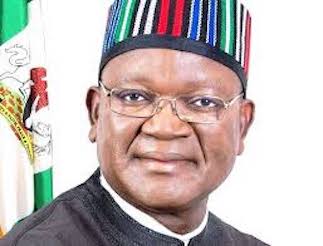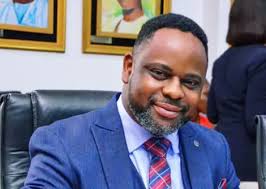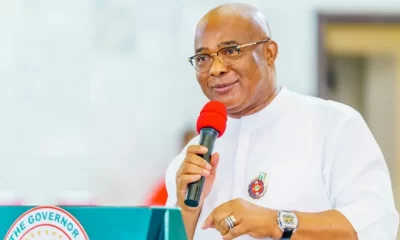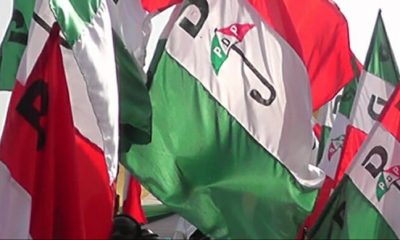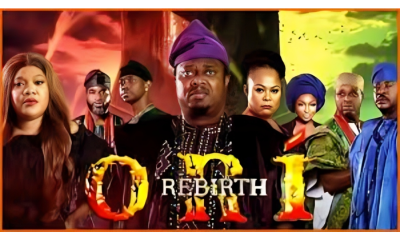OPINION
‘G-5 GOVERNORS,’ 2023 AND ORTOM’S NOVEL “BOTTOM TO TOP” MANTRA
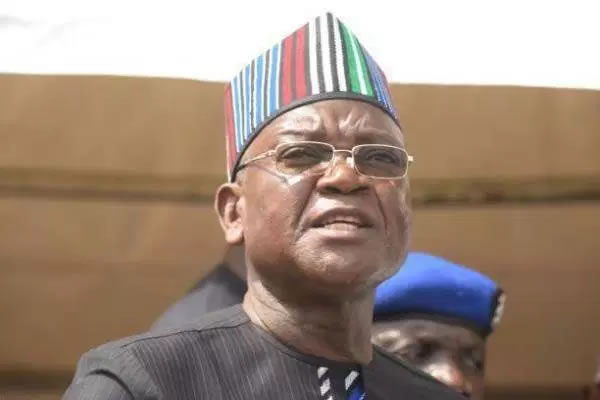
By Tunde Olusunle
Two incidents in the not too distant past, mitigated my physical participation in open-field, free-to-air political events, notably rallies and conventions, in recent times. At a rally of the Peoples’ Democratic Party, (PDP), in Lokoja, the Kogi State capital years ago, I left the venue of the event, relatively lighter than I went.
My prized mobile phone had been pinched from the pocket of my national dress I donned to the event. It was an experience I had never had. With most of us almost wholly dependent on our electronic gadgets for day-to-day functionality, I felt like an orphan having been so criminally dispossessed of my device, for 24 subsequent hours. This was the time span between the pilferage of the equipment, and its eventual replacement. The second experience occurred as I queued to access Eagle Square, Abuja for the convention of the same party in 2017. I least imagined that the wad of currency notes I supposedly secured in one of the less visible pockets of my smart dress, could be so neatly, albeit criminally accessed!
On the recent invitation of the much-misunderstood governor of Benue State, Samuel Ioraer Ortom, however, I broke my subsisting self-censorship. I honoured the flag-off of the Benue State PDP campaigns, held in Makurdi the state capital, on Monday November 7, 2022. Candidates of the PDP contesting for various positions, at all levels in the February and March 2023 polls, were to be formally presented to the PDP family in the state. My longstanding friend and brother, Tivlumun Nyitse, Chief of Staff to Ortom, was the ideal host, on behalf of his Principal.
The pre-event sensitisation was massive. Ortom’s colleagues, who have come to be known as the “G-5,” or the “Integrity Group” as they are interchangeably referred to, in contemporary political discourse, were to headline the event. Nyesom Wike, Seyi Makinde, Okezie Ikpeazu and Ifeanyi Ugwuanyi of Rivers, Oyo, Abia and Enugu respectively, would be storming the “Food basket of the nation,” the legend of Benue State, for the programme. They were coming to stir the Benue river, calmer now than weeks ago when its flooded banks chased the people from their homes and farmlands. The quintet have been vocal and unanimous in speaking up against issues they consider unjust and unfair, in the current structure and operations of their party, vowing never to back-down until their demands are addressed. The issues are public knowledge, and need no rehashing.
The airport at the typically sleepy “Nigerian Airforce Base,” Makurdi, came alive in the evening of Sunday November 6, 2022. Four private jets, each conveying Ortom’s guests, lit up the concreted face of the typically snoozing tarmac. Chief host Ortom would settle his guests in at the recently rehabilitated “Aper Aku” Lodge in Government House, christened after the Second Republic governor of the state. Aku is credited with several multi-sectoral innovations, during his short lived four year term in office. Aper Aku Lodge is an innocuous, yet voluptuous complex with about 25 rooms, backing the Presidential Lodge within the Government House. After dinner with his guests in his own section of the Government House behemoth, Ortom -led his guests on a short walk to the “Banquet Hall” for a reception.
Benue State’s well-known affluent culture was on display. Dances and performances from the major ethnicities in the state, the “Tiv,” “Idoma,” “Igede” and “Agatu,” featured at the event. Ortom’s August guests responded by nodding their heads to the rhythms of music and the footwork of performances, intermittently applauding the performers. Ortom proclaimed the adoption of his guests as *honorary citizens* of Benue State, requesting that the proclamation be recorded in relevant instruments of the government. Wike, Ikpeazu, Makinde and Ugwuanyi were subsequently robed in traditional Tiv attires, complete with ceremonial spears. They took to the dais themselves, and shuffled to the rhythms and songs.
Ortom’s guests woke up the next morning, to a tour and simultaneous commissioning of projects in the state capital and its environs. It was an opportunity for Ortom to beam to the world, some of the infrastructures he had developed for his people. “Dr,” he called me as we chatted, “I find it amusing when people accuse me of not building even a simple bathroom in all my years as governor. I think it’s because I’m media shy. My upbringing and religious inclination, also forbid my blowing my own trumpet.” Ortom continued: “Again, I’m by nature a frugal person. If I reckon that the cost of commissioning a particular project can help us build a culvert somewhere, or a borehole elsewhere, that is more important to me than the fanfare of showcasing things we’ve already put in place.” And Ortom does have a commendable collage of infrastructures to flaunt before the eyes of his August guests and constituents, variously.
They include: The 9.4 kilometre “Tse Poor- Mbakya-Apir road and electricity project,” named after first ever Speaker of the Benue State House of Assembly Ayua Num, which was commissioned by Wike. The 7.7 kilometre “Tse Poor-Mbanima-Yaikyo road and electricity facility” named after Sule Abenga, the late “Ter Makurdi,” was commissioned by Ugwanyi, while the 3.2 kilometre *NKST- Yina- George Akume” road named after the charismatic Joseph Waku, a prominent Tiv leader, was commissioned by Makinde.
A two-kilometre Kaange Akaya- Lucy Aluor- Otukpo road, christened after Wike, was commissioned by Ortom’s predecessor, Gabriel Suswam, who is now a Senator. The two kilometre road runs behind the Commissioners’ Quarters in Makurdi, the state capital. Instructively, the road leads to the residence of Iyorchia Ayu, Chairman of the PDP, with whom the “G-5” have been in the trenches for six months now. This is not overlooking the one and half kilometre “Low Cost Housing Estate-Banban road,” named after Chief JC Obande, a revered Idoma leader, which was also commissioned on the same day.
The “IBB Square,” Makurdi, named after Nigeria’s former military President, Ibrahim Badamasi Babangida is the equivalent of Abuja’s “Eagle Square” and the prime open-air events arena in the state. It was packed full and overflowing into adjoining streets as early as 10am, Monday November 7, even when the city’s ears were yet tingling to the fusion jazz of car honks and sirens, as Ortom and his guests toured various project sites. It was a carnival of PDP colours, a convergence of political greats who headline the politics of the state, and indeed the North Central geopolitical zone.
The “VIP” section of the events place, had a pleasant challenge, contending with the visiting governors, and the “Who’s Who” in Benue State politics. Except for a very prominent political figure in the state and in Nigeria, former President of the Senate, David Mark who is bereaved, and Ayu, still in the eye of the storm, the roll call was as comprehensive as it was astounding.
The sun was sky-high and blistering, foreheads and faces dripping with grime and perspiration. But these were no deterrents to mammoth assemblage at the Square. Beginning with Ortom’s beautiful and indefatigable wife, Eunice, dignitaries at the event included the deputy governor of the state, the immensely humble and unassuming Benson Abounu. Suswam and his senator colleagues from the state, Emmanuel Orker-Jev and Abba Moro, respectively, were in attendance. Ortom is contesting for the senatorial seat of Benue North West, as he concludes his two terms as governor, May 29, 2023. To this extent, he is a candidate. Serving members and intending candidates of the lower national parliament, notably Richard Gbande, Robert Tyough, Julius Atorough, Benjamin Mzondu, Terkaa Agba, Ukah Emmanuel and John Dyegh, were present. Samson Okwu, Aida Nath Ogwuche, Alex Ogbe and Ojotu Ojema, attended the event.
Member of the PDP Board of Trustees, (BOT), Margaret Icheen, acting Chairman of the party in the state, Isaac Mffo and his colleagues in the State Working Committee, were in full attendance. So were members of the Benue State PDP Campaign Management Committee, led by Cletus Tyokyaa. Gubernatorial flagbearer of the PDP in the 2023 election, Titus Uba and his running mate, John Ngbede, featured at the programme. Elder statesman and former Minister of the Federal Republic, Iyorwuese Hagher, and former presidential aide, Mike Mku, equally found time to grace the rally.
Speaker after speaker restated the imperative for all hands to be on deck for the decisive ouster of the seven and half year old regime of the All Progressives Congress, (APC), which has irreparably traumatised Nigeria. Ortom deployed the opportunity to recast the 2015 electioneering slogan by erstwhile APC flagbearer Muhammadu Buhari, Nigeria’s outgoing President. Buhari had intoned in his now famous backlash of a speech at the time, that the “APC will take Nigeria from top to bottom!” Sadly, Buhari’s underwhelming performance over the years, has given a new meaning to that evergreen utterance. It has been interpreted in contemporary political disputation to imply his prophetic resolve to take Nigeria literally from socioeconomic ascendancy, to the valley of all-round poverty, destitution and ignominy.
Ortom’s new mantra proposes a “bottom to top” political prototype.
This anticipates the holistic triumph of the PDP at all levels, beginning from the polling units, through the wards, to the local government areas, onwards to the state, and the federal level. To this extent, the PDP will work towards excelling from the offices of councillors, through local government chairmen, to state assembly members, to federal parliamentarians, to the governorship, and onwards to the presidency. In doing so, Ortom restated that the PDP will not kick away the ropes and ladders with which it sought and received support for ascent to the mountain top. Everyone, every structure from the minutest levels will receive adequate shelter and accommodation under the infinite umbrella of the PDP. Development and dividends of democracy will be fairly apportioned.
Those who expected brickbats and missile-hurling at the event, against the backdrop of the subsisting bad blood between the G-5 and the larger PDP, were most probably disappointed. While expressing his disaffection with the management of rifts and schism within his party, a very realistic Ortom admonished people to vote for their preferred candidates and parties in the coming polls. This must have arisen from his recognition of the dispositions of other party leaders and stakeholders in the state, who have affinity with candidates, different from his preference, especially at the presidential level. A window for possible rapprochement to the subsisting intra-party impasse in the PDP, was opened last Wednesday, when the *G-5* visited Bauchi State governor, Bala Mohammed. Wike spoke on behalf of his colleagues, to the effect that his faction remains open to dialogue and reintegration.
A meeting was reportedly held by Babangida, yesterday which featured Atiku, Aliyu Mohammed Gusau, Okowa, Aminu Tambuwal and former governors Olagunsoye Oyinlola, Bonnie Haruna, Babangida Aliyu, Sule Lamido, Emeka Ihedioha, among others. It may be the eventual olive branch in the mitigation of the subsisting, long-drawn saga. The PDP realises the imperative of confronting the 2023 test as one united family, and will stop at nothing to secure the buy-in of every relevant stakeholder. The APC has adorned itself with ample inflammable oil for comprehensive barbecuing in the 2023 polls. Even at that, the PDP will do better as an undivided, indivisible “combat unit,” to deploy a military terminology.
Tunde Olusunle, PhD, Poet, Journalist, Scholar and Author, is a Member of the Nigerian Guild of Editors, (NGE).
OPINION
Nigeria’s Security: Between Self-defence and Community Policing

By Mukhtar Ya’u Madobi
As Nigeria continues to battle worsening security challenges — ranging from banditry and kidnapping to terrorism, insurgency, and communal violence — citizens across the country are increasingly embracing grassroots security measures and calls for self-defence.
These challenges are not confined to the North. In the South, militancy, piracy, secessionist agitations, cultism, and cybercrimes further complicate the nation’s fragile security landscape. Speaking at the maiden annual lecture of the National Association of the Institute for Security Studies, themed “Mobilising Stakeholders to Curb Insecurity in Nigeria: A Practical Approach,” the Director-General of the State Security Service (SSS), Oluwatosin Ajayi, stressed the need for communities to take greater responsibility for their own security. He cited examples where local populations had historically repelled insurgents and urged communities to work closely with security agencies to counter threats such as terrorism, banditry, and kidnapping.Ajayi noted that it is unrealistic to expect security agencies to protect every citizen across Nigeria’s expansive territory. He argued that communities must serve as the first line of defence, and that empowering them would enhance grassroots resilience, while reducing over-reliance on federal forces.Echoing this position, former Chief of Defence Staff, General TY Danjuma (rtd), recently renewed his longstanding call for Nigerians to rise in self-defence against non-state actors. Reacting to fresh waves of violence in Plateau, Benue, and other states, Danjuma insisted that citizens can no longer afford to remain passive while bandits and terrorists wreak havoc.“The warning I gave years ago remains valid. Nigerians must rise and defend themselves. The government alone cannot protect us,” he said.This message of self-defence has increasingly resonated across vulnerable communities, reflecting the harsh reality of an overstretched security system that leaves millions exposed. The roots of the crisis lie in decades of state neglect, porous borders, weak intelligence systems, and economic exclusion.In the North-West, states such as Zamfara, Katsina, and Kaduna are under the siege of bandits, who raid villages, rustle livestock, extort ransoms, and impose levies. In the North-Central region, particularly Plateau and Benue states, farmer-herder conflicts have morphed into sustained ethno-religious violence. The South-East contends with secessionist violence linked to IPOB/ESN elements, who often target security infrastructure. Meanwhile, the South-West and South-South struggle with cultism, ritual killings, and piracy.One chilling episode was the abduction of more than 280 schoolchildren in Kuriga, Kaduna State, in March 2024. Although the children were eventually rescued, the incident laid bare the glaring weaknesses in Nigeria’s security infrastructure and left the community traumatised.Faced with these realities, several states have begun taking their destinies into their hands. In April, the Kano State Government passed the Security Neighbourhood Watch Law to create a legal framework for community-led security efforts. Katsina has trained local vigilantes through its Community Watch Corps, while in Zamfara, Governor Dauda Lawal launched the Community Protection Guards (CPG), a controversial but welcomed initiative in rural areas long neglected by formal forces.In the North-East, the Civilian Joint Task Force (CJTF) continues to support military efforts against Boko Haram, leveraging local knowledge and swift response capabilities. The Amotekun Corps in the South-West, headquartered in Ondo State, has addressed critical security gaps in the region, earning both criticism and praise. Similarly, the South-East’s Ebube Agu and joint regional outfits in the South-South emerged from the growing public distrust in the federal government’s ability to guarantee safety.However, the growing wave of self-defence and vigilante initiatives raises ethical, legal, and practical concerns. Nigeria’s Firearms Act prohibits civilians from bearing arms without a licence. Without a clear regulatory framework, arming civilians risks escalating violence, enabling political thuggery, and creating new security threats under the guise of protection.These dangers are not hypothetical. In Edo State’s Uromi community, vigilantes wrongfully accused 16 Northern hunters of being kidnappers and burnt them alive. In July 2022, Ebube Agu operatives reportedly killed 14 unarmed wedding guests in Otulu, Imo State. Other vigilante groups in the region have been implicated in extrajudicial killings and abuses. A Daily Trust investigation in April revealed that vigilante groups killed at least 68 people in three months, with many more subjected to torture, harassment, or unlawful detention.These developments have prompted the House of Representatives Committee on Army to call for the regulation, oversight, and training of vigilante groups. The Uromi killings, in particular, triggered national outrage and renewed demands for accountability.Responding to these concerns, Major General Chris Olukolade (rtd), chairman of the Centre for Crisis Communication, acknowledged General Danjuma’s fears but cautioned against unregulated civilian self-defence. He warned that unless communities are engaged within a structured and legal framework, insecurity may only worsen. According to him, civilians should not be armed unless integrated into formal security systems with clear guidelines.Against this backdrop, community policing has emerged as a more sustainable and coordinated alternative. Under the leadership of the Inspector General of Police, pilot schemes have been launched across several states. These involve recruiting and training locals for surveillance, intelligence gathering, and early intervention, followed by their integration into existing police structures.Lagos, Ekiti, and Kano States have all recorded notable progress. In Kano, the Hisbah Corps, initially tasked with moral enforcement, has been reoriented to contribute to broader urban security. In Lagos, the Neighbourhood Safety Corps plays a vital role in gathering intelligence and issuing early warnings.Nonetheless, community policing faces serious limitations. Funding shortfalls, inter-agency rivalries, and a lack of coordination continue to undermine its effectiveness. A major stumbling block is the constitutional contradiction where state governors are designated as chief security officers but lack control over federal police operations within their jurisdictions.Solving Nigeria’s security crisis requires a comprehensive strategy that addresses institutional, legal, and socio-economic issues. First, the constitution must be amended to empower state and community policing structures with defined jurisdictions and robust oversight. Second, vigilante and self-defence groups must be trained, regulated, and integrated into the formal security architecture to avoid becoming a threat themselves. Third, intelligence gathering should begin at the grassroots, where community members are often the first to notice early warning signs. Fourth, addressing the root causes of insecurity — such as unemployment, poverty, and youth disenfranchisement — through investments in education, job creation, and social empowerment is essential. Lastly, traditional and religious leaders must be given formal roles in mediation, peacebuilding, and community-based conflict resolution, given their influence and trust within local populations.Nigeria’s security challenges demand more than rhetoric and reactive responses. While the instinct to defend oneself is natural in the face of government failure, unregulated self-defence is a risky and unsustainable path. The lasting solution lies in creating a decentralised, community-driven security model rooted in legality, ethics, and shared responsibility.As communities across the country face mounting threats, the question is no longer whether to adopt localised security strategies — but how best to coordinate, empower, and regulate them before chaos becomes the norm.Mukhtar Ya’u Madobi is a research fellow at the Centre for Crisis Communication. He can be reached via ymukhtar944@gmail.com.
OPINION
This Trial of Oloyede
By Tunde Akanni
It’s been traumatic for my entire family since that video started making the rounds. I sneaked a slight view… It’s our trial. It’s my trial. Oloyede is genuine. He is most sincere. He is modestly so, as well. For us, however, Allah knows best.
I was with a trader in the afternoon of what I considered a dark Wednesday, the 14th of May. “Se bi won ni JAMB o get mo bayi…”. I had to cut in immediately. Which JAMB? “Madam, that’s one person I will vouch, and vouch for…zero tolerance for corruption. Absolutely responsible with a high level of consciousness for the good of others. If certain things went wrong at JAMB, I agree it’s his responsibility to carry all pleasant and other burdens but just know that the bad side of the operations may as well be sabotage. I have absolute trust in that man. Ask my own colleagues about me, but Oloyede is my own hero, somebody I have known for more than 40 years…”This is by no means a reductionist disposition to the tragedy induced by the so-called computer glitch. May the Almighty God in His infinite mercy console the parents of the candidate reported to have committed suicide. May God strengthen them to survive this gloomy phase of their lives and sustain them to reap bountiful compensation that will endure in their lives. It’s hard, so hard to pull tragedies of this magnitude. I personally feel for these parents.The said computer glitch, may we never fall victim to it. Those who work for big organisations requiring a large layout of ICT operations know what I’m talking about. Rather than being ‘solutional’, IT facilities can be unimaginably problematic sometimes, yet indispensable in this civilisational dispensation. This is not doubting deliberate sabotage, as may have happened in the case of JAMB. I’ve been part of Oloyede’s JAMB journey to attest to his commitment to offer his best for the otherwise sinking board.Far from being cosmetically exhibitionist, the Oloyede-led JAMB team, led by the Education minister, Tunji Alausa, went round the critical facilities of JAMB during the just concluded examination. Alausa saw, firsthand, like never before elsewhere in this country, how far JAMB had gone in its strive for transparency and the real-time monitoring of the conduct of examinations nationwide. Alausa, beyond being in awe, sought to make the JAMB effect spread immediately to other examination bodies.No be dem say, same day, the WAEC team came to JAMB and made it into the situation room, which was my own duty post. The NECO team followed suit afterwards, both duly led around by the sturdy lead IT consultant who’s been reliably there from Oloyede’s assumption of duty, Damilola Bamiro. Far richer, given that they charge more for their exams, the duo of WAEC and NECO were suddenly mandated to understudy the examination sector leader in Africa that JAMB has become over time.The staff of both WAEC and NECO suddenly had to undertake a professional excursion led through all the real time monitoring screens and other digital facilities. It was obvious they marvelled at what they saw, revealing a functional leader-subordinate synergy manifest with trendy output that the world can see and learn from.But that may even seem like the tip of the iceberg of the output of the hard work and commitment of the nation’s foremost icon of integrity in public service. A series of far more seemingly serious strides had been accomplished by Oloyede at JAMB. As a focused scholar, he keeps ensuring that every bit of the experience of the Board is treasured as worthy data to guide future actions and even subjects for further research.Not even the agencies dedicated to emergency matters in Nigeria could have been as prompt as the Oloyede management on this ugly glitch saga. Once the complainants began ventilating into the public space, JAMB rose to the challenge without any predictably traditional arrogant stance of government is always right. I was aware that a particularly strident public critic and a former students’ leader at Obafemi Awolowo University, Adeola Soetan commended the spokesperson for JAMB for the excellent handling of public complaints.Promptly, an independent team of investigators was set up to unravel the mystery leading to the rather depressing situation that now confronts us. The team, drawn from assorted but technically relevant constituencies, has found out that no fewer than 165 centres of over 800 examination centres nationwide were affected.Obviously well prepared for whatever the outcome may turn out to be, he braced up to the challenge to embrace the surrender value to tell it to the world as it is. This trial is for all of us who believe and trust Oloyede. I am in this group. So much so that his public cry infected me…It was a patriot’s cry for his beloved country. Like me, a former Law don at LASU, Dr Kilani wasn’t any less affected as demonstrated in a quick note to me: “I write to associate myself with the pain, sorrow and emotion of our own Professor Oloyede. I could not hold my tears seeing him cry. May Almighty Allah see him through. May we all not be put to shame…”But then came a soothing message from Gbade Osunsoko, my cousin: “…He will come out of this much stronger because Nigerians will trust him far better than a number of our leaders.. A man that makes mistakes happens under him and takes responsibility – it’s a big deal in Nigeria.”With Oloyede, young Nigerians with challenges regarding sight are no longer left to moan their fate endlessly, with adequate provision for their inclusion in the UTME. How many of our public facilities are this inclusion conscious as stipulated by SDGs? How come a legacy built through almost a decade at the very best cost ever possible will be made to crumble when the game changer leader remains ever modest? JAMB has steadily risen through thick and thin to accomplish its tasks to the admiration of stakeholders, nationally and internationally, under Oloyede. Both NNPC and the Nigeria Police, being beneficiaries, can attest to the current competence of JAMB. How many other numerous stakeholders nationwide never deemed to have any relevance to JAMB before Oloyede but have since become critical, if not indispensable players?But why does this sudden saddening encounter threaten our joy of service without blemish? Why this unforeseen truncation of a good story, so intentional, coming from Africa? Whodunnit? Surely the truth shall come out for the world to perceive and assess and get to appreciate the efforts and the quantum of commitment appropriated to the JAMB excellence project driven by Oloyede.One cannot but be deeply concerned. Before the very eyes of a few of us carefully selected to give support from our respective professional perspectives from the very beginning, Professor Oloyede’s concern for genuine growth and development was real. It is still real and increasingly so, as a matter of fact. Indeed, inimitable. It shall be well.Tunde Akanni is a professor of Journalism and Development Communications at the Lagos State University, LASU. Follow him on X:@AkintundeAkanniOPINION
Democracy, Institutions, and the Rule of Law

By Kator Ifyalem
Democracy, often hailed as the cornerstone of modern governance, is a system that empowers citizens to participate in the decision-making processes that shape their lives. However, the mere existence of elections is not enough to ensure a fair, just, and prosperous society.
Without robust institutions, the rule of law, and ingrained values, democracy can become a hollow shell, susceptible to corruption, manipulation, and eventual collapse. At its core, democracy is built on the principle that power resides with the people. This power is exercised through fair elections, where citizens choose representatives to govern on their behalf. The effectiveness of this system relies heavily on the strength of supporting institutions, adherence to the rule of law, and shared values that guide societal behaviour.Institutions serve as the backbone of a democratic society, translating the will of the people into action. These include governmental bodies such as the legislature, executive, and judiciary, as well as independent organizations like electoral commissions, anti-corruption agencies, and human rights commissions. These institutions provide checks and balances, ensuring that no single entity or individual can accumulate too much power. They create a framework for accountability, transparency, and effective governance.An independent judiciary is crucial for upholding the constitution and protecting individual rights. Without it, laws can be manipulated or ignored by those in power, leading to tyranny. Similarly, a free and independent media acts as a watchdog, informing citizens and holding those in power accountable. When media institutions are weakened or controlled by vested interests, the flow of information is compromised, and citizens are unable to make informed decisions.The rule of law is another critical component of a functioning democracy. It ensures that all citizens, regardless of their status or position, are subject to the same laws and legal processes. This principle is fundamental to creating a fair and just society where everyone’s rights are protected. A robust legal framework, consistently and fairly enforced, provides the predictability and security necessary for social and economic development. It protects property rights, enforces contracts, and creates an environment conducive to investment and growth.Moreover, the rule of law is essential for protecting minority rights and preventing the tyranny of the majority. In a true democracy, the rights of all citizens must be respected, even if they are not part of the ruling majority. This protection is enshrined in laws and enforced through effective legal institutions.Values form the third pillar of an effective democracy. These shared beliefs and principles guide societal behaviour and inform policy-making. Democratic values include respect for human rights, tolerance of diversity, commitment to justice, and belief in the equality of all citizens. When these values are deeply ingrained, they act as a safeguard against authoritarian tendencies and help preserve the integrity of democratic institutions.For instance, a healthy democracy can be likened to a three-legged stool, where institutions, the rule of law, and democratic values form the legs. Just as a stool cannot stand stably without all three legs being strong and balanced, a democracy cannot function effectively if any of these elements is weak or missing. In Nigeria’s case, we’ve seen how weaknesses in one area, such as institutional challenges in election management, can put stress on the other legs, requiring the judiciary (rule of law) and civil society (democratic values) to bear more weight to maintain stability.Education plays a crucial role in instilling these values. A well-informed citizenry, aware of their rights and responsibilities, is better equipped to participate meaningfully in the democratic process. Civic education programs that teach the principles of democracy, the importance of institutions, and the value of the rule of law are essential for creating engaged and responsible citizens.The interplay between institutions, the rule of law, and values creates a self-reinforcing cycle that strengthens democracy. However, this cycle can also work in reverse. Weak institutions often lead to a breakdown in the rule of law, eroding democratic values and further weakening the system. This negative spiral will ultimately lead to the collapse of governance, even if the outward trappings of democracy remain.To prevent this decline, concerted effort is required on multiple fronts. Institutional capacity must be built and maintained through adequate funding, training, and support. The rule of law must be consistently enforced, with mechanisms in place to address corruption and abuse of power. This requires not only strong legal frameworks but also a commitment to their implementation.International cooperation also plays a role in strengthening democracy. Countries learn from each other’s experiences, share best practices, and provide support for development. However, it’s crucial to recognize that democracy cannot be imposed from outside; it must be nurtured from within.True democracy requires more than just the act of voting; it demands a comprehensive system of governance that respects the rights of all citizens, upholds justice, and promotes the common good. Strengthening these fundamental pillars (institutions, the rule of law, and values), is crucial in building more resilient, effective, and truly representative democracies that serve the needs of all citizens and contribute to global stability and prosperity. Where does Nigeria as a nation stand on this scale?




